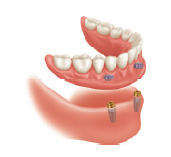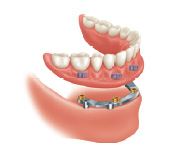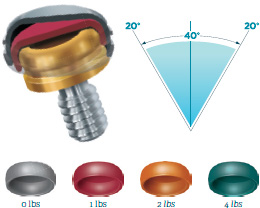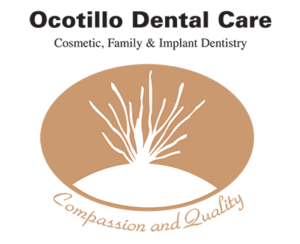
Before implants, denture wearers would suffer. Chewing efficiency was about 10% of normal, and several unpleasant side effects are associated with traditional dentures. Lower dentures are the reason dental implants were invented.
Whether you wear partial dentures or a full denture, dental implants could be a solution to your problem. Dental implants improve a full or partial denture’s support, retention, and stability, reducing the slip and movement while speaking or eating. Many people complain of the fact that their denture doesn’t feel good or it moves too much. With implants, you can be more confident and comfortable while wearing your denture. When you bite down, you will find the implants will hold your denture in place, and it won’t rub your gums as much or push down on your gums, causing fewer sore spots and making it easier and even possible to eat food you thought you could never eat.
You may ask, “What does bone lose mean to me?” Because bone supports the teeth, gums (and implants), it is critical to long-term satisfaction. When a tooth or teeth are lost, bone loss also occurs. Over time a toothless jaw battered by a denture has a substantial bone loss. Dental implants, like teeth, conserve your jawbone. If possible, it is advised that dental implants be placed as soon as possible to avoid excessive bone loss. Dental implants are artificial teeth roots. Depending on the implants’ number and location, you could have a bridge, or you could have your denture “snap” onto the implants.

The more implants you have, the more stable the denture and the more confidence and efficiency in chewing you will experience. In the past, dentists have used two implants to support a denture. Although this is cost-effective, I find that two implants are not enough to benefit the patient. I have used four implants with snap attachments, and I have found that patients do not have the strength or dexterity to manipulate the denture. I think that three implants are a great solution to this problem both in cost and comfort.
There are several different dental attachments on the market at this point. One of the more popular is called the Locator by (Zest Anchors). This “Locator” is an easy connection, and there are many options that patients appreciate. Maintenance is straightforward. The dentist can switch the attachments to give you a tighter fit or looser as needed in a matter of minutes. The replacement of these little inserts is lower in cost because of the ease of use and the parts’ versatility.
Over the last few years, there have been advances in mini-implant design, making it possible for those who could not have implants in the past. These innovations also have affected lowering the cost of mini implants. Another quality of the mini implant is the conservative minimally invasive surgical technique. In the past, the mini implant only had a ball attachment on it but the newer “mini’s” have the Locator attachment too. If you invest in mini implants, please make sure you use the newer technology and use the Locators and not the ball attachments.

- Pivoting Dental Implant Technology
The LOCATOR Male pivots in its permanent Denture Cap for a genuine resilient connection of the prosthesis without any resulting loss of retention. The male remains in static contact with the female socket, while the Denture Cap has a full range of rotational movement over the male. Advantages of implant over-dentures are improved stability, retention chewing, support, aesthetics, speech, and comfort. - Self-aligning Design
The LOCATOR Attachment’s self-aligning feature allows a patient to easily seat their over-denture without the need for accurate alignment and without causing damage to the attachment components. This self-aligning feature also increases the longevity of the LOCATOR. Patients can really bite their dentures into place without harming the attachments.
Remember, the only guarantee in dentistry; if you don’t act, it will only worsen!
To learn more about Dental Implants and Implant Retained Dentures, visit Chandler Dental Implants
 Ocotillo Dental Care, The Chandler Dentist,
Ocotillo Dental Care, The Chandler Dentist,
3165 S. Alma School Rd., Suite #26, Chandler, AZ 85248
Ph: (480) 855-1994